(完整word版)高一英语情态动词练习.docx
- 格式:docx
- 大小:21.03 KB
- 文档页数:4
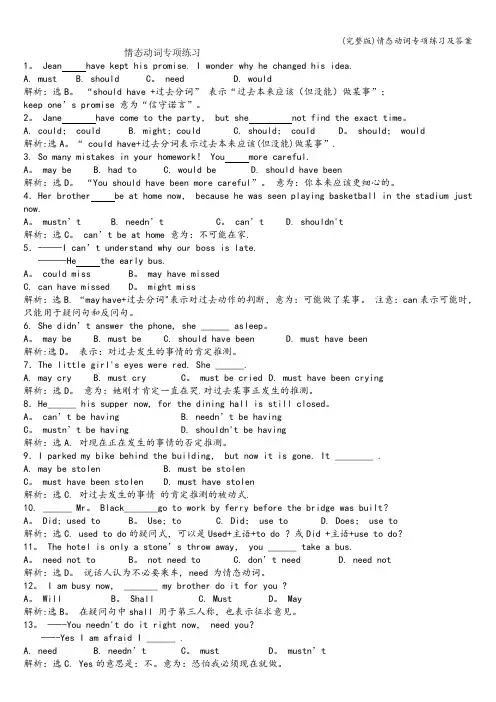
情态动词专项练习1。
Jean have kept his promise. I wonder why he changed his idea.A. mustB. should C。
need D. would解析:选B。
“should have +过去分词” 表示“过去本来应该(但没能)做某事”;keep one’s promise 意为“信守诺言”。
2。
Jane have come to the party, but she not find the exact time。
A. could; couldB. might; couldC. should; could D。
should; would解析:选A。
“ could have+过去分词表示过去本来应该(但没能)做某事”.3. So many mistakes in your homework! You more careful.A。
may be B. had to C. would be D. should have been解析:选D。
“You should have been more careful”。
意为:你本来应该更细心的。
4.Her brother be at home now, because he was seen playing basketball in the stadium just now.A。
mustn’t B. needn’t C。
can’t D. shouldn't解析:选C。
can’t be at home 意为:不可能在家.5.-——I can’t understand why ou r boss is late.———He the early bus.A。
could miss B。
may have missedC. can have missed D。
might miss解析:选B. “may have+过去分词"表示对过去动作的判断,意为:可能做了某事。
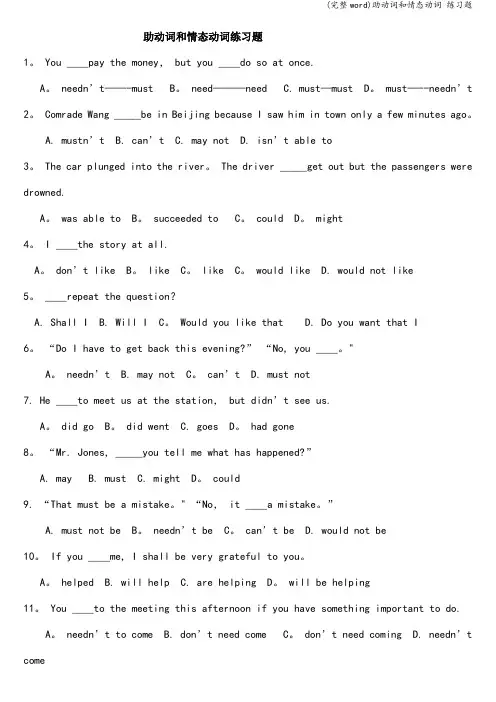
助动词和情态动词练习题1。
You ____pay the money, but you ____do so at once.A。
needn’t——-must B。
need———need C. must—must D。
must—--needn’t 2。
Comrade Wang _____be in Beijing because I saw him in town only a few minutes ago。
A. mustn’tB. can’tC. may notD. isn’t able to3。
The car plunged into the river。
The driver _____get out but the passengers were drowned.A。
was able to B。
succeeded to C。
could D。
might4。
I ____the story at all.A。
don’t like B。
like C。
like C。
would like D. would not like5。
____repeat the question?A. Shall IB. Will I C。
Would you like that D. Do you want that I6。
“Do I have to get back this evening?”“No, you ____。
"A。
needn’t B. may not C。
can’t D. must not7. He ____to meet us at the station, but didn’t see us.A。
did go B。
did went C. goes D。
had gone8。
“Mr. Jones, _____you tell me what has happened?”A. mayB. mustC. might D。
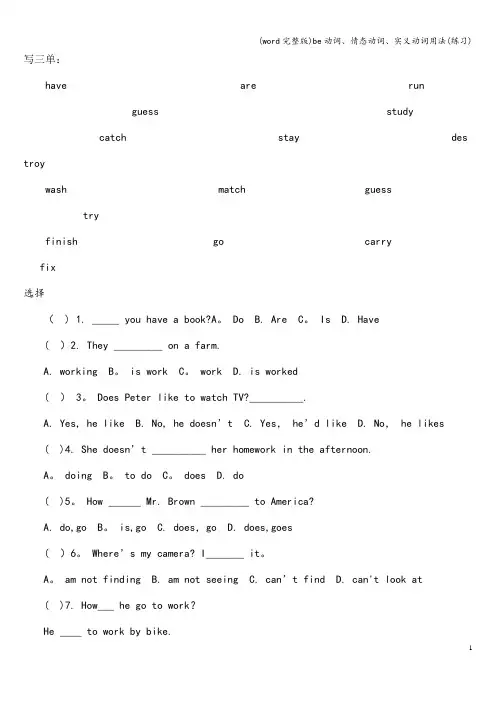
写三单:have are run guess study catch stay des troywash match guesstryfinish go carryfix选择() 1. _____ you have a book?A。
Do B. Are C。
Is D. Have( )2. They _________ on a farm.A. working B。
is work C。
work D. is worked( ) 3。
Does Peter like to watch TV?__________.A. Yes, he likeB. No, he doesn’tC. Yes,he’d likeD. No, he likes( )4. She doesn’t __________ her homework in the afternoon.A。
doing B。
to do C。
does D. do( )5。
How ______ Mr. Brown _________ to America?A. do,go B。
is,go C. does,go D. does,goes( )6。
Where’s my camera? I_______ it。
A。
am not finding B. am not seeing C. can’t find D. can't look at( )7. How___ he go to work?He ____ to work by bike.A。
does ;go B. do;goes C。
do ;go D。
does;goes()8。
___ you usually late for school?No, ___.A. Do ; I am B。
Does ;not C。
Are ;I’m not D。
Are ; I aren’t( )9. _____ she _____ home at six every day?A. Is , leaveB. Does , leaveC. Is , leavesD. Does , left( )10。
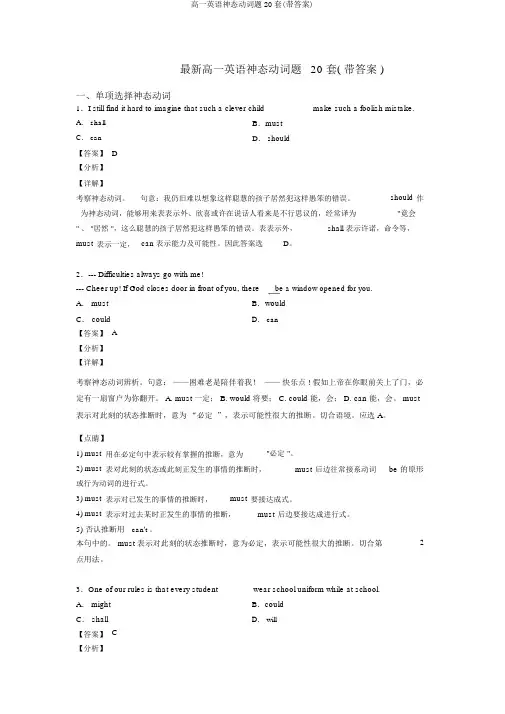
最新高一英语神态动词题20 套( 带答案 )一、单项选择神态动词1.I still find it hard to imagine that such a clever child __________ make such a foolish mistake. A. shall B.mustC. can D. should【答案】D【分析】【详解】考察神态动词。
句意:我仍旧难以想象这样聪慧的孩子居然犯这样愚笨的错误。
should作为神态动词,能够用来表表示外、欣喜或许在说话人看来是不行思议的,经常译为"竟会" 、 "居然 ",这么聪慧的孩子居然犯这样愚笨的错误。
表表示外,shall 表示许诺,命令等,must表示一定,can 表示能力及可能性。
因此答案选D。
2.--- Difficulties always go with me!--- Cheer up! If God closes door in front of you, there be a window opened for you.A. must B.wouldC. could D. can【答案】A【分析】【详解】考察神态动词辨析。
句意:——困难老是陪伴着我!——快乐点 ! 假如上帝在你眼前关上了门,必定有一扇窗户为你翻开。
A. must 一定; B. would 将要; C. could 能,会; D. can 能,会。
must 表示对此刻的状态推断时,意为“必定”,表示可能性很大的推断。
切合语境。
应选 A。
【点睛】1) must用在必定句中表示较有掌握的推断,意为"必定 "。
2) must表对此刻的状态或此刻正发生的事情的推断时,must后边往常接系动词be 的原形或行为动词的进行式。
3) must表示对已发生的事情的推断时,must要接达成式。
4) must表示对过去某时正发生的事情的推断,must后边要接达成进行式。

高一英语精选情态动词练习题1) You____ all those clothes! We have a washing machine to do that sort of thingA) needn't have washed B) shouldn't have washedC) must not have washed D) can not have washed2) John's score on the test is the highest in the class; he____ last night.A) should study B) should have studiedC) must have studied D) must have to study3) The room is in a terrible mess; it ____cleaned.A) can't have been B) shouldn't have beenC) mustn't have been D) wouldn't have been4) Nobody knows how people first came to these islands. They ____ from South America on rafts.A) must have sailed B) can sailC) might have sailed D) should have sailed5) Mary was not in her bedroom yesterday afternoon. She ____ in her classroom.A) should have been B) must have beenC) must be D) should be6) Bob said he was going to join our club but he didn't. He ____ his mind.A) can't have changed B) wouldn't have changedC) must have changed D) shouldn't have changed7) You____ to town to see the film yesterday. It will be on TV tonight.A) needn't go B) had better not goC) should not go D) needn't have gone8) We____ the letter yesterday, but it didn't arrive.A) must receive B) ought to receiveC) must have received D) ought to have received9) With all the work on hand, he____ to the cinema last night.A) mustn't go B) shouldn't have goneC) could not go D) couldn't have gone10) Eve was late for class again. She ____earlier.A) should get up B) must get up C) need to get up D) should have got up11) I am feeling sick. I____ so much chocolate.A) needn't have eaten B) couldn't have eatenC) mustn't have eaten D) shouldn't have eaten12) I didn't send out my application form last week, but I ____.A) had B) would do C) should have D) might have to13) Walking alone in the deserted village, John was scared.He thought he____ Tom to go with him.A) might have asked B) should askedC) must have asked D) should have asked14) When I got to the cinema, the film had already started; I____ there earlier.A) ought to get B) ought to have gotC) must have got D) must get15) The road was muddy. It____ last night.A) must rained B) must have rained C) must be rained D) could have rained16) She can speak quite fluent English. She____.A) must been in the U.S.A. for some timeB) must have been in the U.S.A. for some timeC) should have been in the U.S.A. for some timeD) May be in the U.S.A. for some time17) You should bear in mind that he is not so strong as he____.A) was used to be B) used to be C) was used to D) use to18)“We didn't see him at the exhibition yesterday.”“He ___it.”A) mustn't visit B) can't have visited C) should have gone to see D) may see19) Mary ____my letter, otherwise she would have replied before now.A) should have received B) has receivedC) Couldn't have received D) ought to have received20) I ____ you a valuable present for your birthday, but I was short of money.A) would have liked to give B) liked to giveC) have liked to give D) would like to give21)“Where ____ my umbrella?”“Somebody ____ it away by mistake.”A) is, must have taken B) is, must takeC) have been, must take D) is, takes22) What ____ would happen if the director knew you felt that way?A) will you suppose B) you suppose C) do you suppose D) you would suppose23) Two eyes ____see more than one.A) can B) may C) will D) should24) ____ you continue in your efforts and achieve new and greater successes.A) Would B) Will C) May D) Should25) We ought to help each other in our work, ____?A) oughtn't we B) should we C) shouldn't we D) ought to we26) Tom ____ better than to ask Dick for help.A) shall know B) shouldn't know C) has known D) should have known27) You ____ your tooth pulled out before it rot completely.A) had better got B) had to get better C) had better to get D) had better get28) When we got to the cinema, the film hasn't started yet, so we ____.A) needn't hurry B) didn't need hurryC) needn't to hurry D) needn't have hurried29) It was really very dangerous; you ____ him seriously.A) might have injured B) could injure C) should have injured D) must injure30) As he had heart attack, he was told that he ____ continue the work.A) needn't B) may not C) mustn't D) can't31) An Englishman who ____not speak Italian was once traveling in Italy.A) must B) could C) may D) might32) I ____like to make a suggestion.A) could B) would C) must D) might33) I know things are hard with you, but you ____try to get over the difficulties.A) can B) may C) must D) ought34 I can't find the recorder in the room. It ____ by somebody.A) may have been taken away B) may leaveC) may take away D) must have taken away35) He ____the 9:20 train because he didn't leave home till 9:25.A) can reach B) could catch C) may not catch D) couldn't have caught1)A 2)C 3)A 4)C 5)B 6)C 7)D 8)D 9)D 10)D11)D 12)C 13)D 14)B 15)B 16)B 17)B 18)C 19)C 20)A21)A 22)C 23)A 24)C 25)A 26)D 27)D 28)D 29)A 30)C31)B 32)B 33)C 34)A 35)D。

(英语)高一英语情态动词技巧和方法完整版及练习题一、单项选择情态动词1.It_____ have been Tom that parked the car here, as he is the only one with a car.A.may B.can C.must D.should【答案】C【解析】【详解】考查情态动词表猜测的用法。
句意:一定是汤姆把车停在这儿的,因为他是唯一有车的人。
A. may可能;B. can可能;C. must一定;D. should应该。
由as he is the only one with a car.可知一定是他把车停在这里的,非常有把握的肯定推测,故选C。
2.—_______ you disturb me now? I’m busy preparing a report.— Terribly sorry, but I have something urgent to tell you.A.Need B.Should C.Might D.Must【答案】D【解析】【详解】考查情态动词特殊用法。
句意:—你非要现在打扰我吗?我正在准备一份报告。
—真对不起,但是我怕有紧急事情告诉你。
A. Need需要;B. Should 应该;C. Might也许;D. Must 必须;一定;偏偏,非得;根据语境可知must表示“偏偏,非得”符合上下文语境,用来指责对方。
故D项正确。
3.—Jim ________ what I said annoying though he didn’t say anything.— So you mean you will have to apologize to him?A.must find B.might find C.should have found D.must have found 【答案】D【解析】【详解】考查must have done结构。
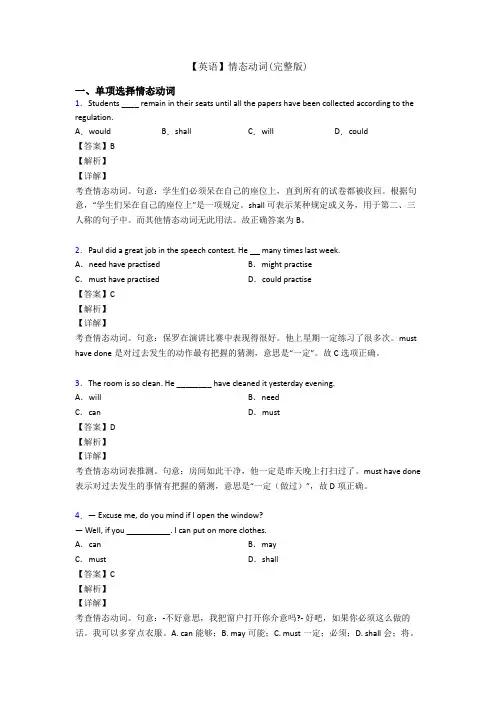
【英语】情态动词(完整版)一、单项选择情态动词1.Students ____ remain in their seats until all the papers have been collected according to the regulation.A.would B.shall C.will D.could【答案】B【解析】【详解】考查情态动词。
句意:学生们必须呆在自己的座位上,直到所有的试卷都被收回。
根据句意,“学生们呆在自己的座位上”是一项规定。
shall 可表示某种规定或义务,用于第二、三人称的句子中。
而其他情态动词无此用法。
故正确答案为B。
2.Paul did a great job in the speech contest. He many times last week.A.need have practised B.might practiseC.must have practised D.could practise【答案】C【解析】【详解】考查情态动词。
句意:保罗在演讲比赛中表现得很好。
他上星期一定练习了很多次。
must have done是对过去发生的动作最有把握的猜测,意思是“一定”。
故C选项正确。
3.The room is so clean. He ________ have cleaned it yesterday evening.A.will B.needC.can D.must【答案】D【解析】【详解】考查情态动词表推测。
句意:房间如此干净,他一定是昨天晚上打扫过了。
must have done 表示对过去发生的事情有把握的猜测,意思是“一定(做过)”,故D项正确。
4.— Excuse me, do you mind if I open the window?— Well, if you __________. I can put on more clothes.A.can B.mayC.must D.shall【答案】C【解析】【详解】考查情态动词。
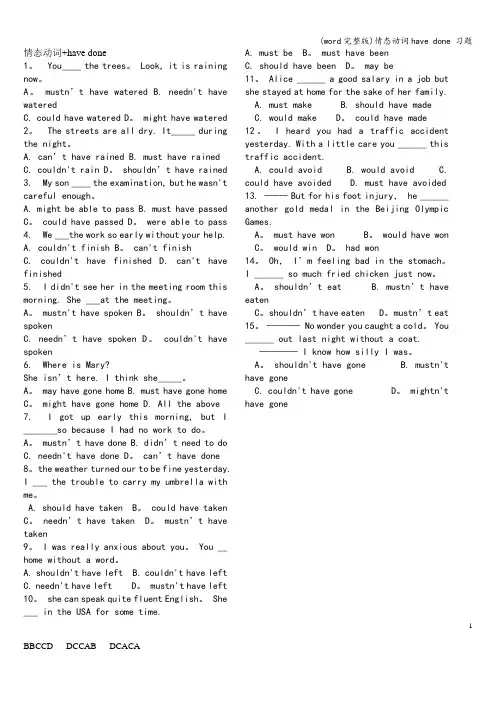
情态动词+have done1。
You____ the trees。
Look, it is raining now。
A。
mustn’t have watered B. needn't have wateredC. could have watered D。
might have watered 2。
The streets are all dry. It_____ during the night。
A. can’t have rainedB. must have rainedC. couldn't rain D。
shouldn’t have rained3. My son ____ the examination, but he wasn't careful enough。
A. might be able to passB. must have passed C。
could have passed D。
were able to pass4. We ___the work so early without your help.A. couldn't finish B。
can't finishC. couldn't have finishedD. can't have finished5. I didn't see her in the meeting room this morning. She ___at the meeting。
A。
mustn't have spoken B。
shouldn’t have spokenC. needn’t have spoken D。
couldn't have spoken6. Where is Mary?Sh e isn’t here. I think she_____。
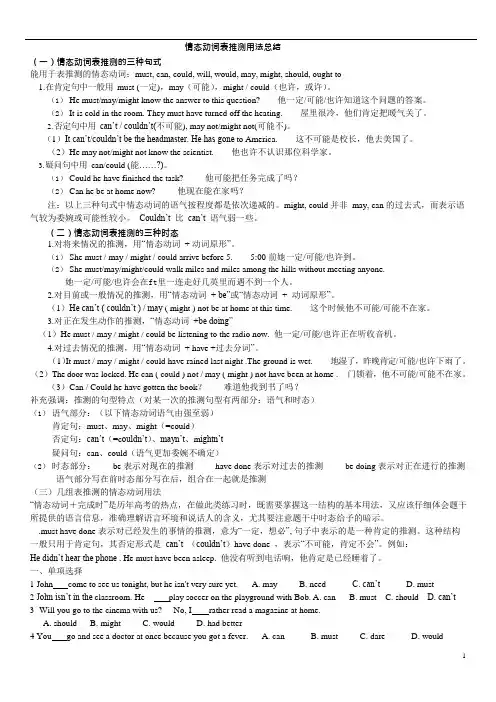
情态动词表推测用法总结(一)情态动词表推测的三种句式能用于表推测的情态动词:must, can, could, will, would, may, might, should, ought to1.在肯定句中一般用must (一定),may(可能),might / could(也许,或许)。
(1)He must/may/might know the answer to this question? 他一定/可能/也许知道这个问题的答案。
(2)It is cold in the room. They must have turned off the heating. 屋里很冷,他们肯定把暖气关了。
2.否定句中用can’t /couldn’t(不可能), may not/might not(可能不)。
(1)It can’t/couldn’t be the headmaster. He has gone to America. 这不可能是校长,他去美国了。
(2)He may not/might not know the scientist. 他也许不认识那位科学家。
3.疑问句中用can/could (能……?)。
(1)Could he have finished the task? 他可能把任务完成了吗?(2)Can he be at home now? 他现在能在家吗?注:以上三种句式中情态动词的语气按程度都是依次递减的。
might, could 并非may, can 的过去式,而表示语气较为委婉或可能性较小。
Couldn’t 比can’t 语气弱一些。
(二)情态动词表推测的三种时态1.对将来情况的推测,用“情态动词+ 动词原形”。
(1)She must / may / might / could arrive before 5. 5:00 前她一定/可能/也许到。
(2)She must/may/might/could walk miles and miles among the hills without meeting anyone.她一定/可能/也许会在ft里一连走好几英里而遇不到一个人。

最新高一英语情态动词解题技巧及练习题(含答案 )一、单项选择情态动词1.It_____ have been Tom that parked the car here, as he is the only one with a car.A. may B. can C. must D. should【答案】C【解析】【详解】考查情态动词表猜测的用法。
句意:一定是汤姆把车停在这儿的,因为他是唯一有车的人。
A. may 可能; B. can 可能; C. must 一定; D. should 应该。
由as he is the only one with a car.可知一定是他把车停在这里的,非常有把握的肯定推测,故选C。
2.—Did you attend the meeting for the experiment project yesterday?— Yes, but I don’ t think I ____ because my director was there.D. need haveA. need to have B. need to C. needed to【答案】 D【解析】【分析】【详解】考查情态动词 +have done 。
句意:——你昨天参加实验项目的会议了吗?——是的,但我想我(本来)不需要,因为我的主管在那里。
Think/suppose 等宾语从句中如果有否定词时,要把从句的否定词 not 前移,即“否定前移”。
所以 not 是从句中的否定词。
“need have done ”意为“本来有必要做而未做”;“ needn ’ t have done指过去”本来没必要做而做了。
根据上一句时间状语“yesterday可”知本句指的是过去发生的事。
结合第二句“because my director was there( 我的主管 )在”可推断出,我本来不必要去。
故选D。
3.— _______ you disturb me now? I’ m busy preparing a report.— Terribly sorry, but I have something urgent to tell you.D. MustA. Need B. Should C. Might【答案】 D【解析】【详解】考查情态动词特殊用法。
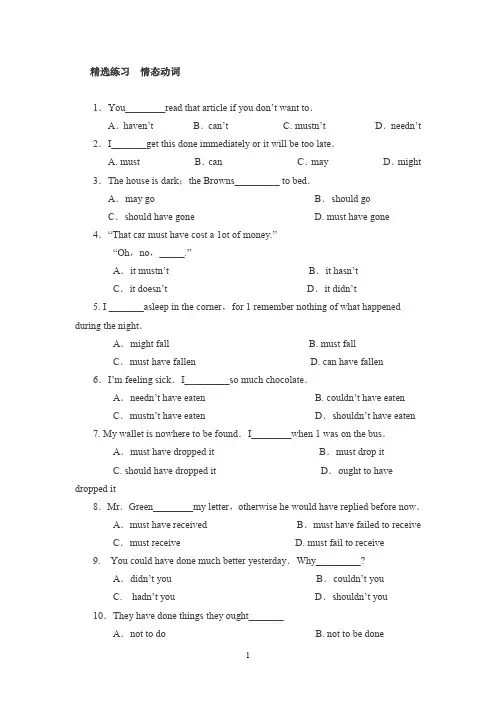
精选练习情态动词1.You________read that article if you don’t want to.A.haven’t B.can’t C. mustn’t D.needn’t 2.I_______get this done immediately or it will be too late.A. must B.can C.may D.might3.The house is dark;the Browns_________ to bed.A.may go B.should goC.should have gone D. must have gone 4.“That car must have cost a 1ot of money.”“Oh,no,_____.”A.it mustn’t B.it hasn’tC.it doesn’t D.it didn’t5. I _______asleep in the corner,for 1 remember nothing of what happened during the night.A.might fall B. must fallC.must have fallen D. can have fallen 6.I’m feeling sick.I_________so much chocolate.A.needn’t have eaten B. couldn’t have eatenC.mustn’t have eaten D.shouldn’t have eaten7. My wallet is nowhere to be found.I________when 1 was on the bus.A.must have dropped it B.must drop itC. should have dropped it D.ought to have dropped it8.Mr.Green________my letter,otherwise he would have replied before now.A.must have received B.must have failed to receiveC.must receive D. must fail to receive9. You could have done much better yesterday.Why_________?A.didn’t you B.couldn’t youC. hadn’t you D.shouldn’t you10.They have done things they ought_______A.not to do B. not to be doneC.not to have done D.not having done11. You had better__________a doctor as soon as possible.A.seen B.saw C.see D.seeing 12.I believe he__________an accident.otherwise he would have arrived on time.A.would have had B. could have hadC.should have had D.must have had 13.Something must have happened on their way here.Or they_______by now.A.should have arrived B.should arriveC.would have arrived D.would arrive14. “Are you coming ‘to Jeff’s party?”“I’m not sure. I _________ go to the concert instead.”A.must B. would C.should D.might 15.“Will you stay for lunch?”“Sorry.___________.My brother is coming to see me.”A.I mustn’t B. I can’t C.I needn’t D.I won’t 16.“I heard they went skiing in the mountains last winter.”“It __________true because there was little snow there.”A.may not be B.won’t be C.couldn’t be D.mustn’t be 17.“Shall we go skating or stay at home?”“Which __________do yourself?”A.do you rather B. would you ratherC.will you rather D.should you rather 18.I was really anxious about you.You_______home without a word.A.mustn’t leave B.shouldn’t have leftC couldn’t have left D.needn’t leave19.Someone is coming here.Who___________it be?A.will B. shall C.must D.can 20.——May I stop here?——No,you_________.A.mustn’t B. might not C.needn’t D.won’t1—5.DADDC 6—10.DABAC 11—15.CDADB 16—20.CBBDA 练习解析1.本句意为:如果你不想,你……读那篇文章。
高一英语情态动词练习吴宏记编1. You ____ me if I am wrong.A. must obeyB. don’t have to obeyC. wouldn’t have obeyedD. can’t have obeyed2.— May I hand in the composition tomorrow?— No, you ____, because I have to go through all of your compositions this evening.A. can’tB. needn’tC. won’tD. shouldn’t3. If you won’t do as I tell you, you ____ go to the dance.A. won’tB. shan’tC. shouldn’tD. mustn’t4. All the people started early so that they ____ there in time.A. gotB. was gettingC. could getD. must get5. — I saw Annie in the supermarket yesterday. — You ____ her; she is still studying abroad.A. mustn’t seeB. can’t have seenC. mustn’t have seenD. couldn’t see6. When I was at school, I ____ up very late, reading story-books.A. used to stayB. used to stayingC. was used to stayD. am used to staying7. — Mr. Wang, I will fetch four chairs for the meeting. — You ____ fetch four; two will do.A. shouldn’tB. mustn’tC. needn’tD. can’t8. — My little daughter is coughing worse than ever. — She ____ to the hospital yesterday.A. had to be takenB. should have takenC. must have been takenD. ought to have been taken9. —I don’t know why he is late.— Nor do I. He ____ an accident.A. could have hadB. should have hadC. might have hadD. must have had10. —Where is Jack? I can’t find him anywhere.— He ____ his homework upstairs.A. might have doneB. must have doneC. must be doingD. must do11. The suggestion the English teacher gave is that the boy ____ more speaking.A. must doB. should doC. would doD. does12. It was possible that I ____ go to America at that time.A. mayB. shallC. mightD. should13. She ____ into the thick forest alone on such a dark night.A. dares not goB. dares not to goC. dare not to goD. doesn’t dare to go14. — Did you listen to the report? — No. We ____ the meeting, but we had a lot of traffic on our way there.A. must have attendedB. shouldn’t have attendedC. could attendedD. could have attended15. I’ve decided to take the job and I ____ change my mind.A. mustn’tB. can’tC. won’tD. may not16. My parents never remember my telephone number, and they always ____look it up.A. mustB. canC. shouldD. have to17. We tried to stop him from going there, but he just ____ listen.A. won’tB. wouldn’tC. might notD. may not18. — ____ he use your bike? — Certainly. Here is the key.A. DoesB. MustC. ShallD. Will19. Oh, dear! What on earth ____this mean?A. couldB. canC. mayD. might20. English is a language that many people around the world ____ not speak perfectly but ____ at least understand.A. would; mightB. will; mustC. might; couldD. can; may21. — ____ it be Li Ping who broke the glass? — No. It ____ be Wu Dong who did it.A. Could; mayB. Can; canC. May; mustD. Can; must22. Tom insisted that what he said ____ true and we insisted that he ____ and have a look.A. be; should goB. should be; would goC. was; goD. was; would go23. I’m sorry I’m s o busy now. I wish I ____ with you.A. can goB. could goC. had goneD. have gone24. There was plenty of time; she ____.A. must have hurriedB. may have hurriedC. needn’t have hurriedD. would have hurried25. — With the help of my father, I finished my homework. — Oh, Jim. You ____ it yourself.A. must have doneB. need have doneC. can doD. should have done26. When the old man was alive, he ____ sit for hours at the door.A. wouldB. couldC. mustD. might27. The children asked whether they ____ go for a swim.A. were able toB. canC. couldD. may28. — When can I come for the dress? I need it the day after tomorrow. — It ____ be ready by 6 pm.A. canB. shouldC. mightD. need29. — I was late again this morning. — Well, I think you had better ____ early.A. start offB. to start outC. started offD. starting out30. — Shall we go swimming or stay at home? — Which ____ do?A. do you ratherB. would you ratherC. will you ratherD. should you rather31. — Are you going to see the film with us? —I’m not sure. I ____ go to Johnson’s party instead.A. mustB. wouldC. shouldD. might32. Michael ____ be a policeman, for he’s mu ch too short.A. needn’tB. can’tC. shouldD. may33. —Why didn’t you come to see me?— I ____, but I was too busy yesterday.A. like toB. should love toC. would like to haveD. am going to34. He ____ the meeting, so he stayed at home.A. needn’t have attendedB. didn’t need to attendC. didn’t need attendD. needn’t to have attend35. — Shall I tell John about it? —No, you ____. I’ve told hi m already.A. needn’tB. wouldn’tC. mustn’tD. shouldn’t36. — There were already five people in the car but they managed to take me as well. — It ____ a comfortable journey.A. can’t beB. shouldn’t beC. mustn’t have beenD. couldn’t have been37. Jack, you ____ play with the knife; you ____ hurt yourself.A. won’t; can’tB. mustn’t; mayC. shouldn’t; mustD. can’t; should38. — Will you stay for lunch? — Sorry, I ____. My mother is coming to see me.A. mustn’tB. can’tC. needn’tD. won’t39. After he has his meal, he ____ go to that coffee shop at the corner.A. used toB. willC. had betterD. dare40. Yesterday Jane walked away from the discussion. Otherwise, she ____ something she would regret later.A. had saidB. saidC. might sayD. might have said41. — Could I call you by your first name? — Yes, you ____.A. willB. couldC. mayD. might42. — Is John coming by air? — He should, but ____ not. He likes taking trains.A. mustB. canC. needD. may43. Mr. Bush is on time for everything. How ____ it be that he was late for the important meeting?A. canB. shouldC. mayD. must44. You can’t imag ine that a well-behaved gentleman ____ be so rude to a lady.A. mightB. needC. shouldD. would45. How ____ you say that you really understand the whole story if you have covered only part of the article?A. canB. mustC. needD. may46. A computer ______ think for itself; it must be told what to do.A. can'tB. couldn'tC. may notD. might not47. The World Wide Web is sometimes jokingly called the World Wide Wait because it _________be very slow.A. shouldB. mustC. willD. can48. --- I stayed at a hotel while in New York. --- Oh, did you? You _____ with Barbara.(1998)A. could have stayedB. could stayC. would stayD. must have stayed49. He __________ have completed his work; otherwise, he wouldn't be enjoying himself by the seaside.A. shouldB. mustC. wouldn'tD. can't50. --- Do you know where David is? I couldn't find him anywhere. --- Well . He ______ have gone far-his coat's still here.A. shouldn'tB. mustn'tC. can'tD. wouldn't51. A left luggage office is a place where bags _______ be left for a short time, especially at a railway station.A. shouldB. canC. mustD. will52. If I ______ plan to do anything I wanted to, I'd like to go to Tibet and travel through as much of it as possible.A. wouldB. couldC. had toD. ought to53. Johnny, you__________ play with the knife, you________ hurt yourself.A. won't; can'tB. mustn't; mayC. shouldn't; mustD. can't; shouldn't54. ---Excuse me, but I want to use your computer to type a report.--- You ______ have my computer if you don't take care of it.A. shan'tB. might notC. needn'tD. shouldn't55. Children under 12 years of age in that country ________ be under adult supervision when is a public library.A. mustB. mayC. canD. need56. You____ all those clothes! We have a washing machine to do that sort of thing.A. needn't have washedB. shouldn't have washedC. must not have washedD. can not have washed57. John's score on the test is the highest in the class; he____ last night.A. should studyB. should have studiedC. must have studiedD. must have to study58. The room is in a terrible mess; it ____cleaned.A. can't have beenB. shouldn't have beenC. mustn't have beenD. wouldn't have been59. Nobody knows how people first came to these islands. They ____ from South America on rafts.A. must have sailedB. can sailC. might have sailedD. should have sailed60. Mary was not in her bedroom yesterday afternoon. She ____ in her classroom.A. should have beenB. must have beenC. must beD. should be61. Bob said he was going to join our club but he didn't. He ____ his mind.A. can't have changedB. wouldn't have changedC. must have changedD. shouldn't have changed62. You____ to town to see the film yesterday. It will be on TV tonight.A. needn't goB. had better not goC. should not goD. needn't have gone63. We____ the letter yesterday, but it didn't arrive.A. must receiveB. ought to receiveC. must have receivedD. ought to have received64. With all the work on hand, he____ to the cinema last night.A. mustn't goB. shouldn't have goneC. could not goD. couldn't have gone65. Eve was late for class again. She ____earlier.A. should get upB. must get upC. need to get upD. should have got up66. I am feeling sick. I____ so much chocolate.A. needn't have eatenB. couldn't have eatenC. mustn't have eatenD. shouldn't have eaten67. I didn't send out my application form last week, but I ____.A. hadB. would doC. should haveD. might have to68. Walking alone in the deserted village, John was scared. He thought he____ Tom to go with him.A. might have askedB. should askedC. must have askedD. should have asked69. When I got to the cinema, the film had already started; I____ there earlier.A. ought to getB. ought to have gotC. must have gotD. must get70. The road was muddy. It____ last night.A. must rainedB. must have rainedC. must be rainedD. could have rained71. She can speak quite fluent English. She____.A. must been in the U.S.A. for some timeB. must have been in the U.S.A. for some timeC. should have been in the U.S.A. for some timeD. May be in the U.S.A. for some time72. You should bear in mind that he is not so strong as he____.A. was used to beB. used to beC. was used toD. use to73. “We didn't see him at the exhibition yesterday.”“He ___it.”A. mustn't visitB. can't have visitedC. should have gone to seeD. may see74. Mary ____my letter, otherwise she would have replied before now.A. should have receivedB. has receivedC. Couldn't have receivedD. ought to have received75. I ____ you a valuable present for your birthday, but I was short of money.A. would have liked to giveB. liked to giveC. have liked to giveD. would like to give76. “Where ____ my umbrella?”“Somebody ____ it away by mistake.”A. is, must have takenB. is, must takeC. have been, must takeD. is, takes77. Two eyes ____see more than one.A. canB. mayC. willD. should78. ____ you continue in your efforts and achieve new and greater successes!A. WouldB. WillC. MayD. Should79. Tom ____ better than to ask Dick for help.A. shall knowB. shouldn't knowC. has knownD. should have known80. When we got to the cinema, the film hasn't started yet, so we ____.A. needn't hurryB. didn't need hurryC. needn't to hurryD. needn't have hurried81. It was really very dangerous; you ____ him seriously.A. might have injuredB. could injureC. should have injuredD. must injure82. As he had heart attack, he was told that he ____ continue the work.A. needn'tB. may notC. mustn'tD. can't83. An Englishman who ____not speak Italian was once traveling in Italy.A. mustB. couldC. mayD. might84. I ____like to make a suggestion.A. couldB. wouldC. mustD. might85. I know things are hard with you, but you ____try to get over the difficulties.A. canB. mayC. mustD. ought1-5 BABCB 6-10 ACDCC 11-15BDDDC 16-20DBCBC 21-25DCBCD 26-30ACBAB31-35DBCBA 36-40DBBBD 41-45CDACA 46-50ADABC 51-55BBBAA 56-60ACACB61-65CDDDD 66-70DCDBB 71-75BBCCA 76-80AACDD 81-85ACBBC。
(word完整版)高中情态动词练习及答案(word版可编辑修改)编辑整理:尊敬的读者朋友们:这里是精品文档编辑中心,本文档内容是由我和我的同事精心编辑整理后发布的,发布之前我们对文中内容进行仔细校对,但是难免会有疏漏的地方,但是任然希望((word完整版)高中情态动词练习及答案(word版可编辑修改))的内容能够给您的工作和学习带来便利。
同时也真诚的希望收到您的建议和反馈,这将是我们进步的源泉,前进的动力。
本文可编辑可修改,如果觉得对您有帮助请收藏以便随时查阅,最后祝您生活愉快业绩进步,以下为(word完整版)高中情态动词练习及答案(word版可编辑修改)的全部内容。
情态动词练习1。
It is usually warm in my hometown in March, but it ____ be rather cold sometimes。
A。
must B. can C。
should D. would2。
You ______ be hungry already ———— you had lunch only two hours ago!A。
wouldn’t B. can’t C. mustn't D. needn’t3。
———- What do you think we can do for our aged parents?-——- You ____ do anything except to be with them and be yourself.A. don’t have to B。
oughtn’t to C。
mustn’t D. can't4。
John promised his doctor he ______ not smoke. And he has never smoked ever since。
A。
might B. should C. could D. would5. What a pity! Considering his ability and experience, he ______ better。
高中英语语法单项选择题分类整理练习情态动词1. —How about paying a visit to Mr. Richardson, our former history teacher?—Good idea. I will e-mail him today so he ___ know ___ to expect us.A. may,whenB. would, whyC. will, howD. shall, why解析:答案是A may用在so、so that、in order that后常表目的。
“我”给他发封e-mail,这样他就可以知道什么时候接我们了。
故选A。
2. When he was there, he ____ go to that coffee shop at he street corner after work every day.A. wouldB. shouldC. had betterD. might解析:答案是 A would可用来表示过去经常性、习惯性的动作,当他在那儿时,他每天下班后都经常到街道拐角处的咖啡店。
故选A。
3.–I can’t find my purse anywhere.-- You __ have lost it while shopping.A. mayB. canC. shouldD. would解析:答案是A 句意为:--我找遍了都没找着钱包---你可能在购物的时候弄丢了。
may表推测常用于肯定句,can表推测常用于否定句和疑问句中。
should:表示应该would:常用在过去将来时中由此可知,A选项正确4. According to the air traffic rules, you ___ switch off your mobile phone before boarding.A. mayB. canC. wouldD. should解析:答案是D 此题考查情态动词的用法。
1.I promised to get there before 5 o’clock,but now the rain is pouring down。
They ______ for me impatiently。
A。
may wait B. ought to wait C。
could wait D。
must be waiting2. He was very brave。
Even though she’d hurt her leg, she ________ go bac k alone。
A。
could B. might C。
have to D. was able to3. You ________ pay too much attention to your reading skill, as it is so important。
A. cannot B。
should C。
must D。
needn’t4。
I’ve tried several times,but the car just _______.A. doesn’t start B。
wouldn't start C。
won’t start D。
didn’t start5。
Always the old lady ______ sit for hours doing nothing at all.A. was used to B。
would C。
used to D。
should6. There used to be a small school,___________?A。
was there B. wasn’t it C. usedn't there D。
usedn’t it7. Our house is on the top of the hill,so in summer the wind _____ be pretty cold.A。
高一英语情态动词练习吴宏记编1.You ____ me if I am wrong.A. must obeyB. don ’ t have to obeyC. wouldn’ t have obeyedD. can ’ t have obeyed2.— May I hand in the composition tomorrow?— No, you ____, because I have to go through all of your compositions this evening.A. can’tB. needn’tC. won ’tD. shouldn’t3.If you won ’ t do as I tell you, you ____ go to the dance.A. won ’tB. shan’tC. shouldn’tD. mustn’t4.All the people started early so that they ____ there in time.A. gotB. was gettingC. could getD. must get5. — I saw Annie in the supermarket yesterday.—You ____ her; she is still studying abroad.A. mustn’ t seeB. can’ t have seenC. mustn’ t have seenD. couldn’ t see6.When I was at school, I ____ up very late, reading story-books.A. used to stayB. used to stayingC. was used to stayD. am used to staying7.— Mr. Wang, I will fetch four chairs for the meeting.— You ____ fetch four; two will do.A. shouldn ’tB. mustn ’tC. needn ’tD. can ’t8.— My little daughter is coughing worse than ever.— She ____ to the hospital yesterday.A. had to be takenB. should have takenC. must have been takenD. ought to have been taken9.— I don ’ t know why he is late. — Nor do I. He ____ an accident.A. could have hadB. should have hadC. might have hadD. must have had10.— Where is Jack? I can’ t find him anywhere—. He ____ his homework upstairs.A. might have doneB. must have doneC. must be doingD. must do11.The suggestion the English teacher gave is that the boy ____ more speaking.A. must doB. should doC. would doD. does12.It was possible that I ____ go to America at that time.A. mayB. shallC. mightD. should13.She ____ into the thick forest alone on such a dark night.A. dares not goB. dares not to goC. dare not to goD. doesn ’ t dare to go14.— Did you listen to the report?— No. We ____ the meeting, but we had a lot of traffic on our way there.A. must have attendedB. shouldn’t have attendedC. could attendedD. could have attended15.I ’ ve decided to take the job and I ____ change my mind.A . mustn ’t B. can’t C. won ’t D. may not16.My parents never remember my telephone number, and they always ____look it up.A. mustB. canC. shouldD. have to17.We tried to stop him from going there, but he just ____ listen.A. won ’tB. wouldn’tC. might notD. may not18.— ____ he use your bike? — Certainly. Here is the key.A. DoesB. MustC. ShallD. Will19.Oh, dear! What on earth ____this mean?A. couldB. canC. mayD. might20.English is a language that many people around the world ____ not speak perfectly but ____ at least understand.A. would; mightB. will; mustC. might; couldD. can; may21.— ____ it be Li Ping who broke the glass? — No. It ____ be Wu Dong who did it.A. Could; mayB. Can; canC. May; mustD. Can; must22.Tom insisted that what he said ____ true and we insisted that he ____ and have a look.A. be; should goB. should be; would goC. was; goD. was; would go23.I ’ m sorry I o’busyms now. I wish I ____ with you.A. can goB. could goC. had goneD. have gone24.There was plenty of time; she ____.A. must have hurriedB. may have hurriedC. needn’ t have hurriedD. would have hurried25.—With the help of my father, I finished my homework.—Oh, Jim. You ____ it yourself.A. must have doneB. need have doneC. can doD. should have done26.When the old man was alive, he ____ sit for hours at the door.A. wouldB. couldC. mustD. might27.The children asked whether they ____ go for a swim.A. were able toB. canC. couldD. may28.—When can I come for the dress? I need it the day after tomorrow.—It ____ be ready by 6 pm.A. canB. shouldC. mightD. need29.—I was late again this morning.—Well, I think you had better ____ early.A. start offB. to start outC. started offD. starting out30.—Shall we go swimming or stay at home?—Which ____ do?A. do you ratherB. would you ratherC. will you ratherD. should you rather31.—Are you going to see the film with us?—I’ m not sure. I ____ go to Johnson’ s party instead.A. mustB. wouldC. shouldD. might32.Michael ____ be a policeman, for he ch too’shortmu.A. needn’tB. can ’tC. shouldD. may33.—Why didn’ t you come to see me?—I ____, but I was too busy yesterday.A. like toB. should love toC. would like to haveD. am going to34.He ____ the meeting, so he stayed at home.A. needn’t have attendedB. didn’ t need to attendC. didn’ t need attendD. needn ’ t to have attend35.—Shall I tell John about it?—No, you ____. I’ ve toldmalreadyhi.A. needn’tB. wouldn’tC. mustn’tD. shouldn’t36.—There were already five people in the car but they managed to take me as well.—It ____ a comfortable journey.A. can ’ t beB. shouldn’ t beC. mustn ’ t have beenD. couldn’ t have been37.Jack, you ____ play with the knife; you ____ hurt yourself.A. won ’ t; can ’tB. mustn’ t; mayC. shouldn ’ t; mustD. can ’ t; should38.—Will you stay for lunch?—Sorry, I ____. My mother is coming to see me.A. mustn’tB. can ’tC. needn’tD. won ’t39.After he has his meal, he ____ go to that coffee shop at the corner.A. used toB. willC. had betterD. dare40.Yesterday Jane walked away from the discussion. Otherwise, she ____ something she would regret later.A. had saidB. saidC. might sayD. might have said41.—Could I call you by your first name?—Yes, you ____.A. willB. couldC. mayD. might42.—Is John coming by air?—He should, but ____ not. He likes taking trains.A. mustB. canC. needD. may43.Mr. Bush is on time for everything. How ____ it be that he was late for the important meeting?A. canB. shouldC. mayD. must44.You can’ t imagine that a well-behaved gentleman ____ be so rude to a lady.A. mightB. needC. shouldD. would45.How ____ you say that you really understand the whole story if you have covered only part of the article?A. canB. mustC. needD. may46.A computer ______ think for itself; it must be told what to do.A. can'tB. couldn'tC. may notD. might not47.The World Wide Web is sometimes jokingly called the World Wide Wait because it _________be very slow.A. shouldB. mustC. willD. can48.--- I stayed at a hotel while in New York.--- Oh, did you? You _____ with Barbara.( 1998)A. could have stayedB. could stayC. would stayD. must have stayed49.He __________ have completed his work; otherwise, he wouldn't be enjoying himself by the seaside.A. shouldB. mustC. wouldn'tD. can't50.--- Do you know where David is? I couldn't find him anywhere.--- Well . He ______ have gone far-his coat's still here.A. shouldn'tB. mustn'tC. can'tD. wouldn't51.A left luggage office is a place where bags _______ be left for a short time, especially at a railway station.A. shouldB. canC. mustD. will52.If I ______ plan to do anything I wanted to, I'd like to go to Tibet and travel through as much of it as possible.A. wouldB. couldC. had toD. ought to53.Johnny, you__________ play with the knife, you________ hurt yourself.A. won't; can'tB. mustn't; mayC. shouldn't; mustD. can't; shouldn't54.---Excuse me, but I want to use your computer to type a report.--- You ______ have my computer if you don't take care of it.A. shan'tB. might notC. needn'tD. shouldn't55.Children under 12 years of age in that country ________ be under adult supervision when is a public library.A. mustB. mayC. canD. need56.You____ all those clothes! We have a washing machine to do that sort of thing.A. needn't have washedB. shouldn't have washedC. must not have washedD. can not have washed57.John's score on the test is the highest in the class; he____ last night.A. should studyB. should have studiedC. must have studiedD. must have to study58.The room is in a terrible mess; it ____cleaned.A. can't have beenB. shouldn't have beenC. mustn't have beenD. wouldn't have been59.Nobody knows how people first came to these islands. They ____ from South America on rafts.A. must have sailedB. can sailC. might have sailedD. should have sailed60.Mary was not in her bedroom yesterday afternoon. She ____ in her classroom.A. should have beenB. must have beenC. must beD. should be61.Bob said he was going to join our club but he didn't. He ____ his mind.A. can't have changedB. wouldn't have changedC. must have changedD. shouldn't have changed62.You____ to town to see the film yesterday. It will be on TV tonight.A. needn't goB. had better not goC. should not goD. needn't have gone63.We____ the letter yesterday, but it didn't arrive.A. must receiveB. ought to receiveC. must have receivedD. ought to have received64.With all the work on hand, he____ to the cinema last night.A. mustn't goB. shouldn't have goneC. could not goD. couldn't have gone65.Eve was late for class again. She ____earlier.A. should get upB. must get upC. need to get upD. should have got up66.I am feeling sick. I____ so much chocolate.A. needn't have eatenB. couldn't have eatenC. mustn't have eatenD. shouldn't have eaten67.I didn't send out my application form last week, but I ____.A. hadB. would doC. should haveD. might have to68.Walking alone in the deserted village, John was scared. He thought he____ Tom to go with him.A. might have askedB. should askedC. must have askedD. should have asked69.When I got to the cinema, the film had already started; I____ there earlier.A. ought to getB. ought to have gotC. must have gotD. must get70.The road was muddy. It____ last night.A. must rainedB. must have rainedC. must be rainedD. could have rained71.She can speak quite fluent English. She____.A. must been in the U.S.A. for some timeB. must have been in the U.S.A. for some timeC. should have been in the U.S.A. for some timeD. May be in the U.S.A. for some time72.You should bear in mind that he is not so strong as he____.A. was used to beB. used to beC. was used toD. use to73.“ We didn't see him at the exhibition yesterday. “ He ___it.””A. mustn't visitB. can't have visitedC. should have gone to seeD. may see74.Mary ____my letter, otherwise she would have replied before now.A. should have receivedB. has receivedC. Couldn't have receivedD. ought to have received75.I ____ you a valuable present for your birthday, but I was short of money.A. would have liked to giveB. liked to giveC. have liked to giveD. would like to give76.“ Where ____ my umbrella? “”Somebody ____ it away by mistake.”A. is, must have takenB. is, must takeC. have been, must takeD. is, takes77.Two eyes ____see more than one.A. canB. mayC. willD. should78.____ you continue in your efforts and achieve new and greater successes !A. WouldB. WillC. MayD. Should79.Tom ____ better than to ask Dick for help.A. shall knowB. shouldn't knowC. has knownD. should have known80.When we got to the cinema, the film hasn't started yet, so we ____.A. needn't hurryB. didn't need hurryC. needn't to hurryD. needn't have hurried81.It was really very dangerous; you ____ him seriously.A. might have injuredB. could injureC. should have injuredD. must injure82.As he had heart attack, he was told that he ____ continue the work.A. needn'tB. may notC. mustn'tD. can't83.An Englishman who ____not speak Italian was once traveling in Italy.A. mustB. couldC. mayD. might84.I ____like to make a suggestion.A. couldB. wouldC. mustD. might85.I know things are hard with you, but you ____try to get over the difficulties.A. canB. mayC. mustD. ought高一英语情态动词练习参考答案1-5 BABCB6-10 ACDCC11-15BDDDC16-20DBCBC21-25DCBCD26-30ACBAB31-35DBCBA36-40DBBBD41-45CDACA46-50ADABC51-55BBBAA56-60ACACB61-65CDDDD66-70DCDBB71-75BBCCA76-80AACDD81-85ACBBC。